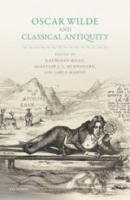
OUP (2018) h/b 382pp £75 (ISBN 9780198789260)
Prefaced with a stylish meditation by actor Edward Petherbridge, this wide-ranging collection of essays originated from a colloquium at the Archive of Performances of Greek and Roman Drama in 2014. It contains the contributions of an inter-disciplinary group of international scholars, benefiting from the work of specialists both in Wildean and Classical Reception studies.
The introduction contextualises Wilde’s literary career with a brief account of his life as the son of cultured parents, who received a rigorous Classical education at Portara Royal School, Trinity College, Dublin and Magdalen College, Oxford, and briefly toyed with the idea of a life in classical scholarship before devoting himself to an artistic career in more popular forms of entertainment, although classics always remained an important influence upon his life and work.
The essays are structured thematically rather than chronologically and cover the major genres of Wilde’s varied output with the exception of poetry and shorter fiction. They offer representative material on his better known works, as well as on his lesser known publications and the manuscript annotations in his personal books, academic essays and private notes. There is some overlap in the material presented by different authors, but this has the benefit of enabling the essays to be read independently of each other. The book contains ten black and white illustrations and a comprehensive bibliography and index.
The essays are grouped under five headings. The first section deals with Wilde’s undergraduate education, tracing the formation of his own version of the Hellenic ideal, the influence upon him of classical authors like Euripides, Aristophanes, Menander and Herodotus, and his developing interest in the application of classics to contemporary philosophical concerns (‘the past in active conversation with the present’ p. 231), as well as his increasing commitment to its wider accessibility to a non-specialist audience. The second part considers Wilde as a dramatist, both as critical spectator of the newly fashionable university Greek plays and as dramatic theorist and theatrical pioneer, for whom art became more important than archaeology in stage performances. These articles trace the kindling of Wilde’s desire to participate in modern, cutting edge culture and his contribution, along with that of Ibsen, Strindberg and Shaw, to the invention of modern, text-based literary drama, designed to provoke an audience into both laughing and thinking, as well as his exploitation of European intellectual trends in the writing of experimental symbolist drama. The third section demonstrates the impact of Wilde’s Oxford training on his philosophical ideas, including the influence of Heraclitus on his concept of hedonism, his championing of Euripides for the playwright’s psychological perception, scepticism and humanity, and his vigorous criticism of the narrow intellectual culture of late nineteenth century middle-class professional England by comparison with that of French writers such as Baudelaire and Balzac. Section Four explores the presence in The Picture of Dorian Gray of Platonic ideas concerning the corruption of the soul and shows Wilde critiquing Lord Henry Wotton’s New Hedonism through his depiction of Dorian’s progress towards eventual self-destruction. It shows the mingling in the novel of Platonic homo-eroticism with Roman homosexual models from the works of Petronius and Suetonius, as well as the contribution made by ideas drawn from Ovid’s treatments of Narcissus and Orpheus. The final group of essays points out the significance of Rome in Wilde’s work despite his life-long Hellenism, of how stories of Roman emperors informed his ideas on decadence, excess and crime and also of how Roman New Comedy influenced the structure and themes of The Importance of Being Earnest, ending with a close analysis of how the play’s New Comedy recognition plot relates to that of Plautus’ Menaechmi with two male protagonist brothers being forced to confront and question their identities, discard their falsely constructed personas and restructure their relations with their families and society.
I greatly enjoyed the varied viewpoints of these illuminating essays, which greatly deepened my understanding of Wilde’s complex love and use of Classics and can heartily recommend the book to scholars and post-graduate students of Classical Reception, English Literature and Theatre Studies. The volume amply fulfils its stated aim of offering a model for studies based around an individual and their use of the Classical tradition.
Claire Gruzelier
